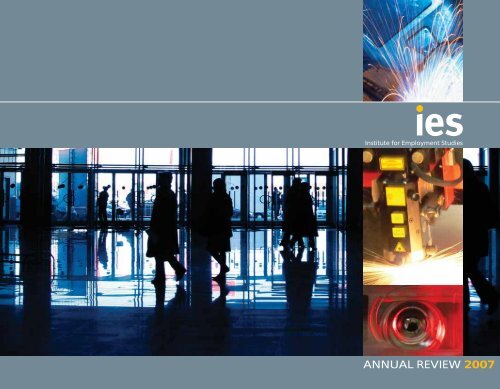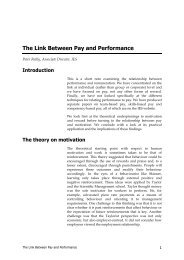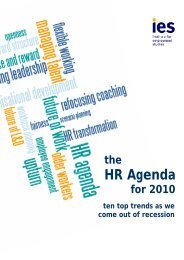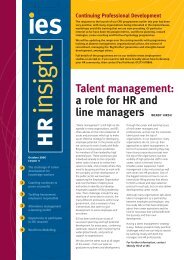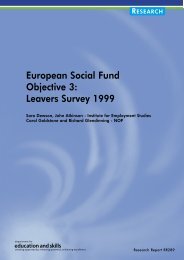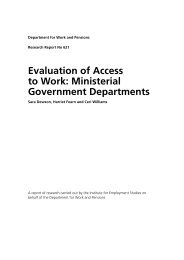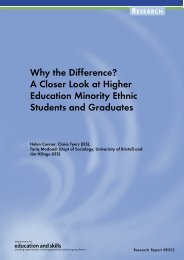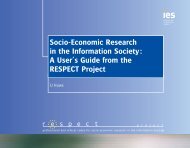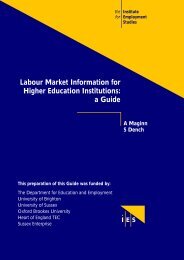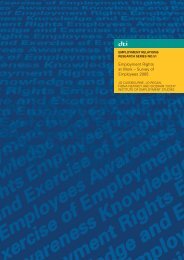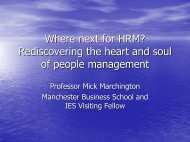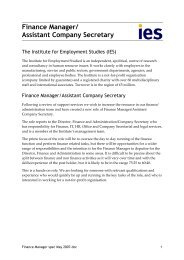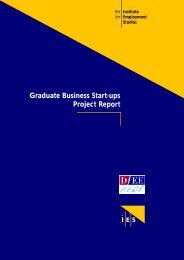PDF of this item - The Institute for Employment Studies
PDF of this item - The Institute for Employment Studies
PDF of this item - The Institute for Employment Studies
You also want an ePaper? Increase the reach of your titles
YUMPU automatically turns print PDFs into web optimized ePapers that Google loves.
<strong>Institute</strong> <strong>for</strong> <strong>Employment</strong> <strong>Studies</strong><br />
ANNUAL REVIEW 2007
ii<br />
IESAnnualReview2007
Contents<br />
From our Vice-President 2<br />
Director’s introduction 3<br />
How IES works 5<br />
Public employment policy research at IES 6<br />
Research and consultancy on human resource management 9<br />
<strong>The</strong> IES HR Network 12<br />
IES Council and Board <strong>of</strong> Trustees 14<br />
Staff and associates 15<br />
Partner organisations 16<br />
Financial summary 17<br />
Clients 18<br />
An active institute: publications, papers and presentations 20<br />
Advisory roles 27<br />
<strong>The</strong> IES mission 28<br />
www.employment-studies.co.uk<br />
1
From our Vice-President<br />
As outgoing Chairman <strong>of</strong> the IES Board <strong>of</strong> Trustees, I am delighted<br />
to introduce <strong>this</strong> Review, highlighting the main features <strong>of</strong> another<br />
strong year <strong>for</strong> IES. <strong>The</strong> work <strong>of</strong> IES remains at the <strong>for</strong>efront <strong>of</strong><br />
thinking on employment and HR issues, and the volume and<br />
influence <strong>of</strong> that work has expanded again during the year. During<br />
the year, investment has been made in resources to support the<br />
growing volume <strong>of</strong> work with employers both in the private and<br />
public sectors. We have also launched our revised corporate<br />
membership programme (the IES HR Network) and we look<br />
<strong>for</strong>ward to increasing our work programmes from <strong>this</strong> investment<br />
in the years ahead. <strong>The</strong> <strong>Institute</strong>’s finances remain extremely<br />
healthy. In line with our charitable mission to improve decisionmaking<br />
in employment policy and HR practice, considerable<br />
emphasis has been placed on the dissemination <strong>of</strong> IES work, and<br />
its reputation is reflected in the growing level <strong>of</strong> media coverage<br />
and recognition <strong>of</strong> IES in the public policy and HR marketplaces,<br />
both in the UK and in mainland Europe. Equally, it is reflected in<br />
the calibre <strong>of</strong> the individuals who choose to work with IES as<br />
members <strong>of</strong> its Board and Council, and I would like to thank all <strong>of</strong><br />
my colleagues <strong>for</strong> their contributions in supporting and guiding IES<br />
during the year. It has been a pleasure to serve as Chairman <strong>of</strong> the<br />
Board <strong>of</strong> Trustees and I would like to wish both the staff and<br />
clients <strong>of</strong> IES all the very best <strong>for</strong> the future.<br />
Anne Minto OBE<br />
Vice-President<br />
2 IESAnnualReview2007
Director’s introduction<br />
Nigel Meager<br />
IES Director<br />
Once again, I am happy to report on a<br />
strong and successful year at IES. <strong>The</strong><br />
volume <strong>of</strong> our commissioned research<br />
and consultancy work grew steadily,<br />
and the <strong>Institute</strong>’s financial position<br />
remains healthy.<br />
IES is a charitable, not-<strong>for</strong>-pr<strong>of</strong>it body which exists <strong>for</strong> one purpose<br />
only, as set out in our mission, namely to bring about sustainable<br />
improvements in employment policy and HR management. We do<br />
<strong>this</strong> through increasing the understanding and improving the<br />
practice <strong>of</strong> key decision-makers in public policy bodies and<br />
employing organisations, both in the UK and internationally.<br />
This means that in choosing and undertaking all our research and<br />
consultancy work, we aim to ensure that it makes a difference, and<br />
a real contribution to public benefit. We do not attempt to add to<br />
knowledge <strong>for</strong> its own sake, but we always have two key<br />
objectives in mind: first that our work can be used and applied by<br />
decision-makers to improve policy and practice; and second that<br />
the results <strong>of</strong> our work are disseminated to reach as wide an<br />
audience as possible. Of course, there are sometimes tensions<br />
between these objectives and the need to attract funding and<br />
ensure the financial viability <strong>of</strong> the <strong>Institute</strong> – and a balance has to<br />
be struck. How well that balance has been struck can be judged<br />
through the examples <strong>of</strong> our work that fill the pages <strong>of</strong> <strong>this</strong> Annual<br />
Review. Looking back on the last year, however, it is clear that IES’<br />
public policy work continues to illuminate the important policy<br />
questions <strong>of</strong> the day, and that its work <strong>for</strong> public and private sector<br />
employers continues to provide evidence-based solutions <strong>for</strong> HR<br />
practitioners.<br />
On the public policy side, we remain at the <strong>for</strong>efront <strong>of</strong> UK<br />
research and evaluation on labour market disadvantage, welfareto-work,<br />
learning and skills policy. In line with growing policy<br />
interest in the health and well-being <strong>of</strong> the work<strong>for</strong>ce, our<br />
programme <strong>of</strong> work on <strong>this</strong> topic has continued to develop<br />
strongly over the year, and has now become one <strong>of</strong> the <strong>Institute</strong>’s<br />
strongest work areas. <strong>Employment</strong> relations is a smaller<br />
www.employment-studies.co.uk<br />
3
programme area, but one in which we have invested in the last<br />
year, and which is also growing in volume terms. Outside our main<br />
programme areas, IES work continues to address emerging and<br />
contemporary issues on the public policy agenda. One <strong>of</strong> these<br />
has been migration, and we have followed our recent work on<br />
employers’ attitudes and practices to migrant workers, with a new<br />
study <strong>for</strong> the Home Office looking at how employers will engage<br />
with the new points-based system <strong>for</strong> managing migration into<br />
the UK.<br />
On the employer side, we have continued to build on our dual<br />
approach to working with HR directors and practitioners: on the<br />
one hand undertaking bespoke research and consultancy projects<br />
on topics <strong>of</strong> current HR interest, and on the other providing a<br />
range <strong>of</strong> services to corporate members <strong>of</strong> our HR Network,<br />
including our new continuing pr<strong>of</strong>essional development (CPD)<br />
programme. During the year we have made major investments in<br />
new senior staff to support both strands <strong>of</strong> our employer work.<br />
As documented elsewhere in <strong>this</strong> Review, the year has seen a<br />
particular emphasis on the wide dissemination <strong>of</strong> IES research<br />
findings and insights, through the media and specialist press, as<br />
well as our own publications, including our range <strong>of</strong> newsletters<br />
targeted at our different stakeholder groups. Alongside our regular<br />
HR conference <strong>for</strong> IES corporate members, we launched the first<br />
annual IES public policy conference in autumn 2006, focusing on<br />
age and employment (to coincide with the new age discrimination<br />
legislation). <strong>The</strong> success <strong>of</strong> that launch is being followed by the<br />
second public policy conference in autumn 2007: <strong>this</strong> will focus on<br />
the implementation <strong>of</strong> the Leitch review recommendations <strong>for</strong> UK<br />
skills policy, and will again be run alongside the annual HR<br />
conference (the subject <strong>of</strong> which is talent management). It is<br />
pleasing to note that all <strong>of</strong> the main indicators <strong>of</strong> IES dissemination<br />
grew significantly during the year, including our own publications,<br />
conference presentations and journal articles and our coverage in<br />
the media. <strong>The</strong> influence <strong>of</strong> IES work is measured, however, not<br />
just through the growing volume <strong>of</strong> dissemination, but also<br />
through the increasing recognition <strong>of</strong> IES work as reflected in the<br />
appointment <strong>of</strong> IES staff to influential pr<strong>of</strong>essional and advisory<br />
bodies, contributions to select committees and the frequent<br />
citation <strong>of</strong> IES research in green papers, and reports <strong>of</strong> government<br />
task <strong>for</strong>ces and review bodies. A particular highlight was the recent<br />
award <strong>of</strong> an MBE to Jim Hillage who leads IES work on learning<br />
and skills, a very tangible acknowledgement <strong>of</strong> the contribution <strong>of</strong><br />
his work and that <strong>of</strong> his team to public policy development in <strong>this</strong><br />
area.<br />
4 IESAnnualReview2007
How IES works<br />
IES was established in 1969 to be an<br />
independent, national centre <strong>of</strong> expertise on<br />
productivity, manpower planning and labour<br />
market change. Since that time it has<br />
expanded and diversified to become the UK’s<br />
leading independent centre <strong>for</strong> research and<br />
evidence-based consultancy in employment,<br />
labour market and human resource policy<br />
and practice. It is not-<strong>for</strong>-pr<strong>of</strong>it, its activities<br />
being funded through research and<br />
consultancy commissions, and from its<br />
corporate membership programme.<br />
Several key principles underlie the operation <strong>of</strong> IES.<br />
Independence and dissemination<br />
<strong>The</strong> purpose <strong>of</strong> IES, set out in its mission, is to help bring about<br />
sustainable improvements in employment policy and human<br />
resource management. It does <strong>this</strong> through its research and<br />
consultancy work, by increasing the understanding and improving<br />
the practice <strong>of</strong> key decision-makers in public policy bodies and in<br />
employing organisations in the private and public sectors. Crucial<br />
to the <strong>Institute</strong>’s mission, and underpinning its charitable status, is<br />
that it should in<strong>for</strong>m not simply those who directly commission our<br />
research and consultancy, but also the wider community <strong>of</strong> policyand<br />
decision-makers. This provides the <strong>Institute</strong> with a strong<br />
motivation to publish and disseminate the findings <strong>of</strong> its work.<br />
Multidisciplinary<br />
IES aims to deploy a wide range <strong>of</strong> expertise in its work,<br />
approaching problems from different disciplinary perspectives and,<br />
where appropriate, combining those perspectives in its research<br />
and consultancy projects. IES has 66 staff including 49 pr<strong>of</strong>essional<br />
researchers and consultants, among whom are economists,<br />
econometricians, statisticians, sociologists, management scientists,<br />
geographers and occupational psychologists. In addition, we work<br />
with an extensive network <strong>of</strong> individual associates and partner<br />
organisations, enabling us to bring a further range <strong>of</strong> specialist<br />
expertise to individual projects as required.<br />
A dual focus on public policy and employers<br />
Although IES has evolved and developed considerably since its<br />
founding in the 1960s, a unique and constant feature <strong>of</strong> the<br />
<strong>Institute</strong> has been its dual focus on work <strong>for</strong> public policy-makers<br />
on the one hand and employers on the other. This stems from a<br />
recognition that the employment policies <strong>of</strong> the state and its<br />
agencies, and the HR policies and practices <strong>of</strong> employers are two<br />
sides <strong>of</strong> the same coin, and that to meet its mission, IES must<br />
pursue a balanced portfolio <strong>of</strong> work <strong>for</strong> both sides. This portfolio is<br />
set out in more detail in the following pages. On page 6 to 8 we<br />
detail the past year’s extensive range <strong>of</strong> research on public policy<br />
topic areas, together with our international work. Pages 9 to 11<br />
highlight our work with and <strong>for</strong> employers, which falls under two<br />
broad headings: project work <strong>for</strong> employers or employer<br />
organisations, which is a mixture <strong>of</strong> research and<br />
consultancy/advice; and our corporate membership programme,<br />
the IES HR Network, which brings employers together to learn<br />
from and contribute to the evidence base on HR policy and<br />
practice.<br />
www.employment-studies.co.uk<br />
5
Public employment policy research at IES<br />
IES contributes to the development <strong>of</strong><br />
public employment policy by carrying<br />
out authoritative research <strong>of</strong> practical<br />
relevance to all those responsible <strong>for</strong><br />
designing and implementing policy<br />
programmes and initiatives.<br />
Our research is commissioned by UK national and sub-national<br />
government departments and agencies, as well as regional and<br />
sectoral organisations. We also have a growing portfolio <strong>of</strong> work<br />
<strong>for</strong> international and overseas policy bodies.<br />
This work spans all aspects <strong>of</strong> employment policy and labour<br />
market activity, and is mainly organised around four broad themes.<br />
Unemployment and labour market disadvantage<br />
<strong>The</strong> main objective <strong>of</strong> UK public employment policy has been to<br />
ensure that sustained economic buoyancy translates not only into<br />
high levels <strong>of</strong> employment, but also improved employment<br />
opportunities in parts <strong>of</strong> the labour market where disadvantage,<br />
inactivity and social exclusion remain strong. In the past year, after<br />
the Freud Review 1 , finding more innovative ways <strong>of</strong> doing so has<br />
also become an objective. IES research is in<strong>for</strong>ming the pursuit <strong>of</strong><br />
both these goals.<br />
1 ‘Reducing dependency, increasing opportunity: options <strong>for</strong> the future <strong>of</strong><br />
welfare to work’ David Freud, DWP, March 2007<br />
6 IESAnnualReview2007<br />
■<br />
■<br />
■<br />
Over the past year we have continued to assess how, and how far,<br />
active labour market programmes have been reaching the most<br />
disadvantaged and disenfranchised communities and individuals.<br />
Our work has clustered around:<br />
evaluations <strong>of</strong> area-based initiatives, to find out how effectively<br />
they are reaching into inner city areas and communities previously<br />
reliant on traditional industries, where long-term unemployment<br />
and inactivity remain high. Our evaluation <strong>of</strong> the Fair Cities Pilots<br />
has thrown considerable light on effective ways <strong>of</strong> helping<br />
workless people from inner city ethnic minority communities. Our<br />
contribution to the evaluation <strong>of</strong> the Cities Strategy Pathfinders<br />
continues to build on <strong>this</strong> insight and expertise.<br />
hard-to-help groups. Our work on approaches to outreach <strong>for</strong><br />
partners among ethnic minority groups extends our interest in the<br />
employability <strong>of</strong> Pakistani and Bangladeshi women, while<br />
simultaneously evaluating innovative methods <strong>of</strong> reaching them.<br />
Similarly, our research into ex-<strong>of</strong>fenders <strong>for</strong> the Department <strong>of</strong><br />
Work and Pensions (DWP) is focusing on the lessons <strong>of</strong> several<br />
small-scale pilots which aim in their different ways to improve<br />
employment prospects and reduce recidivism.<br />
Our research also monitors the ongoing effectiveness <strong>of</strong> public<br />
programmes and legislation in redressing aspects <strong>of</strong> disadvantage<br />
in employment. Our long-term interest in employment and<br />
disability has been enhanced <strong>this</strong> year with work on an evaluation<br />
<strong>of</strong> Access to Work, and a review <strong>of</strong> employers’ views, policies and<br />
practices towards the employment <strong>of</strong> people with mental health<br />
problems.<br />
Looking to the future, we now see a strong need to focus on<br />
low/no skill, white, male, youths; their particular difficulties have<br />
slipped somewhat out <strong>of</strong> focus among public policy-makers almost<br />
as quickly as their chances <strong>of</strong> finding sustained and decent<br />
employment in an increasingly competitive labour market have<br />
deteriorated.
Assessing the impact <strong>of</strong> the Disability Discrimination Act<br />
In partnership with Ipsos MORI, we examined employers’ awareness <strong>of</strong><br />
the Disability Discrimination Act (DDA) through a survey <strong>of</strong> 2,000<br />
employers, supplemented by 50 case studies. Employer awareness had<br />
increased over the past three years, although many did not recognise that<br />
some prevalent conditions like diabetes and asthma were covered by the<br />
Act. We also found that employers generally appeared to have more<br />
positive attitudes towards the employment <strong>of</strong> disabled people, although<br />
<strong>this</strong> was mainly focused on existing employees rather than potential new<br />
recruits, and the proportion <strong>of</strong> disabled people in employment had not<br />
increased. <strong>The</strong> report, published in March 2007 by the DWP,<br />
recommended that more be done to widen employers’ understanding <strong>of</strong><br />
the conditions covered by the DDA and to focus on recruitment as well as<br />
retention, both themes reflected in recent publicity campaigns.<br />
Learning and Skills<br />
<strong>The</strong> <strong>Institute</strong>’s portfolio <strong>of</strong> work on the learning and skills agenda<br />
addresses most <strong>of</strong> the major policy issues currently facing the UK.<br />
<strong>The</strong> Brown government has expressed interest in raising to 18 the<br />
age at which young people have to be in some <strong>for</strong>m <strong>of</strong><br />
compulsory education or structured training. IES, in partnership<br />
with the National Centre <strong>for</strong> Social Research (NatCen), and the<br />
Centre <strong>for</strong> Education and Industry, is evaluating the Activity and<br />
Learning Agreements. <strong>The</strong>se are aimed at providing opportunities<br />
<strong>for</strong> young people not in education, or in jobs without training, to<br />
progress towards a structured training activity, and are designed to<br />
help develop policy towards a compulsory learning age.<br />
<strong>The</strong> government has also announced further changes to the higher<br />
education student finance regime. We will be able to help assess<br />
the impact <strong>of</strong> these and other changes through the latest Student<br />
Income and Expenditure Survey we are conducting with NatCen,<br />
and through another project about the role <strong>of</strong> finance and<br />
financial support in the decision-making <strong>of</strong> prospective HE<br />
students, <strong>for</strong> the new Department <strong>for</strong> Innovation, Universities and<br />
Skills. We are also examining the widening participation aspect <strong>of</strong><br />
the government’s higher education policy through a study looking<br />
at why some people with the potential to go to university have not<br />
done so.<br />
<strong>The</strong> Leitch review <strong>of</strong> skills highlighted the importance <strong>of</strong> upskilling<br />
the work<strong>for</strong>ce at all levels, in order to both compete economically<br />
and develop a more inclusive society. To succeed, the UK must not<br />
only improve the quality <strong>of</strong> initial skills supply, but also encourage<br />
more skill development among those already in work. IES is<br />
helping to evaluate the two main measures outlined in the<br />
government’s response to Leitch to improve adult skill<br />
development: Train to Gain, and the Skills Accounts currently<br />
being piloted in parts <strong>of</strong> England.<br />
Work, health and well-being at work<br />
<strong>The</strong> development <strong>of</strong> adult careers services<br />
<strong>The</strong> <strong>Institute</strong> recently completed two projects about publicly-funded<br />
careers services <strong>for</strong> adults which fed into the government’s review <strong>of</strong><br />
in<strong>for</strong>mation, advice and guidance (IAG) services and its response to the<br />
Leitch Review <strong>of</strong> skill needs in the UK. One project, in partnership with<br />
the National <strong>Institute</strong> <strong>for</strong> Careers Education and Counselling evaluated<br />
the learndirect telephone guidance trial. <strong>The</strong> other study, with Ipsos<br />
MORI, assessed the longer-term impacts <strong>of</strong> advice and guidance on lowskilled<br />
adults by tracking them over two and a half years. <strong>The</strong> studies<br />
showed that different people need different types <strong>of</strong> support at different<br />
points in their career, but the right in-depth support can help them make<br />
important changes.<br />
Our research into work, health and well-being continues to grow.<br />
We support the Health and Safety Executive (HSE) by providing<br />
evaluative evidence on new initiatives aimed at developing advice<br />
and support <strong>for</strong> employers. Our evaluation <strong>of</strong> the national<br />
Workplace Health Connect service, <strong>for</strong> example, continues,<br />
assessing occupational health support <strong>for</strong> smaller employers. In<br />
addition, the HSE has asked IES to investigate how employers are<br />
implementing its Management Standards <strong>for</strong> work-related stress.<br />
<strong>The</strong>se are the central plank in the HSE strategy to meet its targets<br />
on stress reduction. Both initiatives reflect the use <strong>of</strong> a ‘guidance’<br />
rather than a regulatory approach.<br />
www.employment-studies.co.uk<br />
7
Making builders fitter<br />
We have also conducted a review <strong>of</strong> the effectiveness <strong>of</strong><br />
workplace health interventions <strong>for</strong> the government’s Health, Work<br />
and Wellbeing Executive. <strong>The</strong> government is keen to encourage<br />
employers to take an active role in preventing and managing<br />
health conditions, and helping individuals return to work after<br />
illness. IES’s review will help the Executive in taking <strong>for</strong>ward <strong>this</strong><br />
agenda.<br />
We are looking at mental health conditions and employment in a<br />
joint project with the Social Policy Research Unit at York University<br />
<strong>for</strong> the DWP. This examines employers’ understanding <strong>of</strong> mental<br />
health conditions in the context <strong>of</strong> the Disability Discrimination<br />
Act, and their recruitment and employment policies and practices,<br />
including retention responses. It also explores the experiences <strong>of</strong><br />
employees with mental health conditions.<br />
All these research projects feed into government policy on<br />
increasing and improving employment, and improving<br />
productivity through reducing sickness absence and inactivity.<br />
<strong>Employment</strong> relations<br />
Another major strand <strong>of</strong> our work covers the relationships<br />
between employers and employees, individuals’ rights at work and<br />
consultation processes and mechanisms. This year the (<strong>for</strong>mer)<br />
Department <strong>for</strong> Trade and Industry published our survey <strong>of</strong><br />
employees’ views <strong>of</strong> their work-life balance. For Acas we<br />
undertook the first evaluation <strong>of</strong> individuals’ experiences in<br />
pursuing employment tribunal claims <strong>for</strong> discrimination on<br />
grounds <strong>of</strong> sexual orientation, religion or belief, and also a user<br />
satisfaction survey <strong>of</strong> callers to the Acas helpline. Our employment<br />
relations work has also developed an international dimension (see<br />
below).<br />
We evaluated the Constructing Better Health pilot organised by the HSE.<br />
It ran in Leicestershire and aimed to raise awareness about occupational<br />
health issues in the construction industry. <strong>The</strong> evaluation examined<br />
service provision, take-up and impact on workplace practices and health<br />
outcomes. Despite the preconceptions <strong>of</strong> many construction employers,<br />
the evaluation showed that workers were interested in their own health.<br />
<strong>The</strong> main challenges in improving occupational health practice were<br />
changing managerial, rather than worker, behaviour and attitudes. <strong>The</strong><br />
initiative had a positive impact on workplace practice through its contact<br />
with workers, although wholesale change will need continued<br />
management commitment. A national scheme, building on the lessons<br />
from the pilot is currently being developed by the HSE.<br />
INTERNATIONAL<br />
Our international work is growing steadily. We continue to provide<br />
expert support to the understanding and exchange <strong>of</strong> good<br />
practice in employment policy between EU member states,<br />
through our co-ordination role in the Mutual Learning Programme<br />
<strong>of</strong> the European <strong>Employment</strong> Strategy. Over the past year we<br />
have a developed a flow <strong>of</strong> work <strong>for</strong> the European Foundation <strong>for</strong><br />
the Improvement <strong>of</strong> Working and Living Conditions, in Dublin,<br />
including: investigating the influence <strong>of</strong> social dialogue on working<br />
conditions in EU member states and Norway, and analysing the<br />
implications <strong>of</strong> the EU Working-Time Directive <strong>for</strong> the road<br />
transport sector. We have also further developed our comparative<br />
research with Scandinavian and Dutch partners looking at aspects<br />
<strong>of</strong> disabled people’s employment.<br />
8 IESAnnualReview2007
Research and consultancy on<br />
human resource management<br />
IES <strong>of</strong>fers two distinct, but linked, groups <strong>of</strong><br />
services to employers. We undertake<br />
research and consultancy assignments <strong>for</strong> all<br />
types <strong>of</strong> organisation, irrespective <strong>of</strong> size or<br />
sector. Thus we work <strong>for</strong> private sector<br />
organisations as well as public and voluntary<br />
sector organisations, and also <strong>for</strong><br />
membership bodies such as the Chartered<br />
<strong>Institute</strong> <strong>of</strong> Personnel and Development<br />
(CIPD). Moreover, through our HR Network,<br />
we deliver a programme <strong>of</strong> research, events<br />
and training <strong>for</strong> member organisations,<br />
again drawn from the private, public and<br />
voluntary sectors. For member and nonmember<br />
organisations, besides undertaking<br />
research and consultancy assignments, we<br />
organise consortium-funded research<br />
projects and deliver continuing pr<strong>of</strong>essional<br />
development (CPD) training.<br />
We carry out projects by ourselves, but also<br />
in partnership with other organisations.<br />
Projects may involve data gathering, be<br />
advisory in nature, concerned with design<br />
and evaluation, or action-oriented, working<br />
together and problem solving with clients.<br />
We undertake projects <strong>of</strong> a research or consultancy nature under<br />
five thematic headings, described in the sections below.<br />
Organisational per<strong>for</strong>mance<br />
Over the last couple <strong>of</strong> years we have examined the connection<br />
between people inputs (eg skills or attitudes) and organisational<br />
per<strong>for</strong>mance. This research has developed further into creating<br />
tools <strong>for</strong> organisations to use in self-auditing how well they are<br />
doing, or <strong>for</strong> agencies (like Investors in People UK) to apply to<br />
assessing people per<strong>for</strong>mance in organisations.<br />
We will extend our organisational per<strong>for</strong>mance research by<br />
looking at effective work organisation and its impact not just on<br />
business results but on employee satisfaction and well-being.<br />
Resourcing and development<br />
<strong>The</strong> recruitment and development <strong>of</strong> staff is an activity undertaken<br />
by all organisations. Some choose to describe these activities as<br />
‘talent management’ and <strong>this</strong> has been a strategic concept <strong>for</strong> HR<br />
practitioners in these organisations <strong>for</strong> a number <strong>of</strong> years. It is a<br />
tricky concept to define, in that it may involve the whole<br />
work<strong>for</strong>ce or be limited to those in managerial roles, or aspiring to<br />
those positions, but, in either case, it should combine the ‘bringing<br />
in’ <strong>of</strong> talent with the ‘bringing on’ <strong>of</strong> talent. We undertake work<br />
that concerns systemic talent management processes or specific<br />
resourcing activities (such as e-recruitment or graduate hiring),<br />
career management practices (eg succession planning or career<br />
paths) and development approaches (eg, leadership learning or<br />
coaching interventions). This work may focus on particular<br />
occupational groups (eg knowledge workers), sectors (eg health)<br />
or grades.<br />
www.employment-studies.co.uk<br />
9
Reward and per<strong>for</strong>mance management<br />
In both areas – reward and per<strong>for</strong>mance management – we<br />
continue to undertake assignments on the design and evaluation<br />
<strong>of</strong> systems <strong>for</strong> a wide variety <strong>of</strong> clients. Modernisation is driven by<br />
a number <strong>of</strong> causes: the requirement to demonstrate compliance<br />
with equal pay legislation; the need <strong>for</strong> a better per<strong>for</strong>mance/<br />
reward link; harmonisation <strong>of</strong> terms and conditions across<br />
employee groups; or a change in business circumstances (such as<br />
merger or new market positioning).<br />
For some organisations, the presenting problem is a requirement<br />
<strong>for</strong> greater strategic direction. For others it is to deal with a specific<br />
issue (the difficulty in recruiting and retaining). A third common<br />
cause <strong>of</strong> reward change derives from organisational change<br />
(eg merger or acquisition).<br />
Motivation and well-being<br />
A well-used IES expertise is in seeking to understand employee<br />
satisfaction, attitudes and opinions via surveys. <strong>The</strong>se can be tied<br />
to general measures <strong>of</strong> employee engagement or to specific<br />
questions <strong>of</strong> why people stay or leave organisations. Of late,<br />
employers are expressing particular interest in ‘wellness’ at work.<br />
This can be physical or psychological well-being. Looking at the<br />
consequences <strong>of</strong> unsatisfactory engagement or ill health, we have<br />
undertaken several projects recently on absence at work – the<br />
causes and solutions.<br />
Work in <strong>this</strong> area aims to examine issues both from the employee<br />
perspective and from the employer viewpoint. <strong>The</strong> connection<br />
between the two has now been demonstrated.<br />
HR functional excellence<br />
<strong>The</strong> HR function has undergone significant change in recent years.<br />
Many organisations have reorganised HR, redesigned processes<br />
and automated activities where possible. We executed a number<br />
<strong>of</strong> research projects in <strong>this</strong> area during the year, looking at new HR<br />
structures or roles and development issues <strong>for</strong> HR pr<strong>of</strong>essionals.<br />
We have examined these topics generally as well as in specific<br />
sectors. This knowledge has been applied to advisory work on<br />
designing HR structures, understanding HR capability and<br />
customer opinion, and in developing business partners.<br />
HOW WE OPERATE<br />
Through its work <strong>for</strong> employers, IES <strong>of</strong>fers the link between<br />
research and consultancy. We aim to learn from our research and<br />
apply it in our consultancy, and vice versa.<br />
Corporate members <strong>of</strong> the IES HR Network (see page 12) also<br />
have the opportunity to shape and participate in the research, and<br />
to receive the results at member events. Research projects funded<br />
through the HR Network during the year have covered the<br />
effectiveness <strong>of</strong> individual per<strong>for</strong>mance-related pay and the<br />
customer view <strong>of</strong> HR. Also <strong>for</strong> HR Network members, we are<br />
continuing our action learning set on human capital metrics, and<br />
we have started a project looking at older workers in employment.<br />
Publications stemming from HR Network research during the year<br />
have included a range <strong>of</strong> IES reports (eg on coaching), papers (eg<br />
on mental health at work) and opinion pieces (eg on assessment<br />
processes).<br />
Our project work <strong>for</strong> employer clients is <strong>of</strong> two main types: some<br />
projects extend the research we do <strong>for</strong> corporate members <strong>of</strong> the<br />
HR Network; others apply it in practical settings through<br />
consultancy assignments. Our work, <strong>for</strong> example, on the HR<br />
function led to carrying out research <strong>for</strong> CIPD on how changing<br />
organisational structures might impact on career paths and<br />
development opportunities. This was published as Managing and<br />
Developing HR Careers: Emerging Trends and Issues. Another<br />
project <strong>for</strong> CIPD focused on the impact <strong>of</strong> HR trans<strong>for</strong>mation on<br />
the structure, processes and staffing <strong>of</strong> organisations. <strong>The</strong> initial<br />
findings were presented in a CIPD report <strong>The</strong> Changing HR<br />
Function: <strong>The</strong> Key Questions and the final report is being<br />
published in November 2007 by CIPD as <strong>The</strong> Changing HR<br />
Function: Trans<strong>for</strong>ming HR. Another project <strong>for</strong> the National<br />
Health Service Improvement and Innovation Agency is featured<br />
opposite.<br />
10 IESAnnualReview2007
Improved people management <strong>for</strong> sustainable service<br />
improvement in healthcare<br />
For the NHSI we evaluated research on the functional contribution <strong>of</strong> HR,<br />
Organisation Development (OD) and associated pr<strong>of</strong>essionals to<br />
organisational per<strong>for</strong>mance, as well as the impact <strong>of</strong> more general people<br />
management practices. This learning was then considered in a healthcare<br />
context. <strong>The</strong> opportunities that improved people management <strong>of</strong>fers <strong>for</strong><br />
sustainable service improvement in healthcare were set out. This work has<br />
been published as Human Resources, Organisational Development and<br />
Work<strong>for</strong>ce Development in the NHS: A Review <strong>of</strong> Recent Research.<br />
In the programme area <strong>of</strong> resourcing and development, IES has<br />
carried out a diverse range <strong>of</strong> projects during the year: evaluating<br />
coaching interventions and two different management<br />
development initiatives <strong>for</strong> the NHSI; examining the recruitment <strong>of</strong><br />
ethnic minorities into the senior civil service <strong>for</strong> the Department <strong>for</strong><br />
Work and Pensions; coaching interventions <strong>for</strong> various local<br />
authorities; succession planning workshops <strong>for</strong> the Improvement<br />
and Development Agency (IDeA) in local government and career<br />
workshops <strong>for</strong> Rolls Royce; examining flexible career options <strong>for</strong><br />
the Royal Navy.<br />
Veterinary career perceptions<br />
In-company work has included: obtaining customer views <strong>of</strong> HR;<br />
helping develop cross-organisational working in the NHS through<br />
designing shared service operations; and delivering business<br />
partner training.<br />
In the reward strand <strong>of</strong> the reward and per<strong>for</strong>mance management<br />
programme we have carried out several equal pay reviews,<br />
especially <strong>for</strong> local government, and pay modernisation projects,<br />
especially <strong>for</strong> central government. Under the per<strong>for</strong>mance<br />
management strand, we undertook a review <strong>of</strong> the operation <strong>of</strong><br />
per<strong>for</strong>mance appraisal <strong>for</strong> the Police Federation, by looking at the<br />
effectiveness <strong>of</strong> its design and implementation in eight police<br />
<strong>for</strong>ces, and we designed and implemented a new appraisal scheme<br />
<strong>for</strong> the Society and College <strong>of</strong> Radiographers.<br />
Pay structure review and equality pro<strong>of</strong>ing<br />
IES has helped the Treasury Solicitor’s Office (TSol) examine its pay<br />
structure. This has involved consultation with management and trade<br />
unions, and detailed design work, as the organisation has looked to<br />
shorten pay ranges and reposition itself in the market. Subsequently, IES<br />
assisted TSol in carrying out an equal pay review to ensure that<br />
remuneration policies, processes and practices did not lead to any<br />
instances <strong>of</strong> discrimination.<br />
<strong>The</strong> Royal College <strong>of</strong> Veterinary Surgeons (RCVS) invited IES to carry out<br />
research on perceptions <strong>of</strong> the veterinary pr<strong>of</strong>ession, and what messages<br />
veterinary schools are giving about the pr<strong>of</strong>ession to potential students<br />
via open days and prospectuses. IES reviewed careers websites and<br />
university in<strong>for</strong>mation, and conducted focus groups and interviews with<br />
students, science teachers, careers advisers and university admissions<br />
tutors. We also placed two questions in Ipsos-MORI’s 2007 student<br />
omnibus survey to obtain their views.<br />
Research in the motivation and well-being programme area during<br />
the year has been represented through projects <strong>for</strong> National<br />
<strong>Institute</strong> <strong>for</strong> Health and Clinical Excellence (NICE) on the<br />
management <strong>of</strong> long-term sickness absence and incapacity, and a<br />
similar project <strong>for</strong> the Home Office and the Health and Safety<br />
Executive. A consortium-funded project examining whether early<br />
pr<strong>of</strong>essional mediation in occupational health can be effective was<br />
started during the year.<br />
Projects relating to the organisational per<strong>for</strong>mance programme<br />
area during the year have included looking at culture change at<br />
Cambridgeshire County Council; reviewing changes in work<br />
pr<strong>of</strong>iles <strong>for</strong> Surrey Police; and providing tools in change<br />
management in the health service.<br />
www.employment-studies.co.uk<br />
11
<strong>The</strong> IES HR Network<br />
<strong>The</strong> IES HR Network combines membership <strong>of</strong> a select<br />
community <strong>of</strong> leading edge employers with access to<br />
research carried out by one <strong>of</strong> the UK’s <strong>for</strong>emost<br />
employment research institutes.<br />
■<br />
■<br />
■<br />
■<br />
■<br />
<strong>The</strong> IES HR Network is a central part <strong>of</strong> IES’s activities, as the close<br />
relationship we have with our members ensures that we undertake<br />
relevant research and provides an opportunity to disseminate it in<br />
an appropriate manner. To underline the importance <strong>of</strong><br />
membership, two new roles were created <strong>this</strong> year:<br />
Membership Manager (Jo Davis)<br />
Head <strong>of</strong> Business Development (Martyn Smith)<br />
Membership is by invitation and is open to organisations that we<br />
believe will both benefit from the services and contribute to the<br />
Network. All members have access to the activities and resources,<br />
arranged under each <strong>of</strong> the five themes:<br />
organisational per<strong>for</strong>mance<br />
resourcing and development<br />
reward and per<strong>for</strong>mance<br />
motivation and well-being<br />
HR functional excellence.<br />
Throughout the year members take part in an exclusive series <strong>of</strong><br />
regular seminars and workshops, together with our annual<br />
conferences. <strong>The</strong> concept <strong>of</strong> the HR Network is one <strong>of</strong><br />
participation in the sharing, development and application <strong>of</strong><br />
knowledge <strong>for</strong> good practice people management.<br />
Network events and conferences combine a unique mix <strong>of</strong><br />
research findings, client organisation presentations, and the<br />
opportunity to share experiences in a confidential community.<br />
Briefing Papers are produced on a frequent basis to provide the<br />
membership with good practice, leading-edge thinking, and IES<br />
opinion about future issues, and giving short, sharp input on<br />
critical issues.<br />
This year we published thirteen HR Network papers and reports,<br />
on topics ranging from organisational justice to mental health at<br />
work, and remuneration following mergers to evaluating coaching<br />
(full list <strong>of</strong> publications, page 20).<br />
<strong>The</strong> HR Network research programme has centred on three<br />
projects – customer views <strong>of</strong> HR, human capital management<br />
measurement and the efficacy <strong>of</strong> per<strong>for</strong>mance pay. <strong>The</strong> research<br />
took different <strong>for</strong>ms <strong>for</strong> each <strong>of</strong> the projects. On per<strong>for</strong>mance<br />
related pay we looked at the research evidence that argued in<br />
favour or against linking reward to individual per<strong>for</strong>mance. <strong>The</strong><br />
human capital measurement approach was one <strong>of</strong> action-oriented<br />
12 IESAnnualReview2007
collaboration through a series <strong>of</strong> workshops. <strong>The</strong> customer view <strong>of</strong><br />
HR both looked at earlier research in <strong>this</strong> area and undertook a<br />
number <strong>of</strong> case studies that explored practice in these<br />
organisations.<br />
Current members<br />
■<br />
■<br />
■<br />
<strong>The</strong> Members-only website contains all IES-published research,<br />
unpublished material available only to members, and<br />
presentations from IES events and some external conferences<br />
where IES contributed. Anyone from a Member organisation is<br />
entitled to access the Members-only website.<br />
Each member organisation has an allocated Membership<br />
Relationship Manager at IES so that the individual member’s<br />
needs can be addressed, and involvement with the Network can<br />
be maximised.<br />
We also <strong>of</strong>fer a programme <strong>of</strong> Continuing Pr<strong>of</strong>essional<br />
Development. Run in-house <strong>for</strong> members, these events focus on<br />
capabilities that set excellent HR people apart from the rest.<br />
Membership can bring free credits and/or reduced rates <strong>for</strong> our<br />
programme. This includes:<br />
Masterclasses that present knowledge, research, examples and<br />
insights <strong>for</strong> tackling specific issues<br />
Solutions Workshops that <strong>of</strong>fer processes to help develop a<br />
strategy, approach or solve a particular business issue<br />
Advanced Skills Development that focuses on skills that help HR<br />
pr<strong>of</strong>essionals make the most effective impact on their<br />
organisation.<br />
Our members have enjoyed the benefits <strong>of</strong> the CPD programme<br />
on such areas as reward, work<strong>for</strong>ce planning and positive<br />
psychology. We will continue to revise and improve on the range<br />
<strong>of</strong> sessions <strong>of</strong>fered.<br />
New model<br />
With the aim <strong>of</strong> further enhancing the membership experience,<br />
our membership model will be reshaped. From the autumn <strong>of</strong><br />
2007 <strong>this</strong> will mean altering the number and nature <strong>of</strong> events to<br />
<strong>of</strong>fer greater breadth <strong>of</strong> content, flexibility and topicality thereby<br />
encouraging wider participation.<br />
Aegis Group plc<br />
Aegon<br />
Barclays Bank plc<br />
British Broadcasting Corporation<br />
BUPA<br />
Cabinet Office<br />
Centrica plc<br />
Civil Aviation Authority<br />
Corus Group<br />
Department <strong>for</strong> Business Enterprise<br />
and Regulatory Re<strong>for</strong>m<br />
Department <strong>for</strong> Communities and<br />
Local Government<br />
Department <strong>for</strong> Children, Schools<br />
and Families<br />
Department <strong>for</strong> Innovation,<br />
Universities and Skills<br />
Department <strong>for</strong> Environment, Food<br />
and Rural Affairs<br />
Department <strong>for</strong> Transport<br />
Department <strong>for</strong> Work and Pensions<br />
East Sussex County Council<br />
Foreign & Commonwealth Office<br />
HBOS plc<br />
HM Prison Service<br />
HM Revenue & Customs<br />
Home Office<br />
Home Retail Group plc<br />
HSBC Bank plc<br />
Improvement and Development<br />
Agency<br />
Infineum International Ltd<br />
<strong>Institute</strong> <strong>of</strong> Cancer Research<br />
J Sainsbury plc<br />
Lloyds TSB Group<br />
London Councils<br />
Marks & Spencer plc<br />
MCCH Society Ltd<br />
Ministry <strong>of</strong> Defence<br />
Mitsubishi Corporation (UK) plc<br />
Northern Foods plc<br />
Office <strong>for</strong> National Statistics<br />
Ordnance Survey<br />
Orion Partners<br />
Rolls-Royce plc<br />
Royal Bank <strong>of</strong> Scotland Group<br />
Royal Mail Group plc<br />
Royal Navy<br />
Scottish Leadership Foundation<br />
Scottish & Newcastle plc<br />
Scottish Water<br />
Shell in the UK<br />
Siemens IT Solutions and Services<br />
T-Mobile<br />
Transport <strong>for</strong> London<br />
<strong>The</strong> Wellcome Trust Sanger<br />
<strong>Institute</strong><br />
www.employment-studies.co.uk<br />
13
IES Council and Board <strong>of</strong> Trustees<br />
Our Council provides<br />
guidance, advice and<br />
President<br />
Sir David Varney*<br />
Carolyn Gray<br />
Guardian Media Group<br />
Honorary Life President<br />
Sir John Cassels CB<br />
support to staff in<br />
furthering the <strong>Institute</strong>’s<br />
mission and long-term<br />
objectives. <strong>The</strong> Board, a<br />
Vice-President and Board Chair<br />
Stephen Haddrill*<br />
Association <strong>of</strong> British Insurers<br />
Roger McClure<br />
<strong>The</strong> Scottish Funding Council<br />
Sam Mercer<br />
Employers Forum on Age<br />
We are pleased to welcome to<br />
our Council <strong>this</strong> year Paul<br />
Milliken.<br />
subgroup <strong>of</strong> Council<br />
chaired by Stephen<br />
Haddrill, acts as the <strong>for</strong>mal<br />
trustees and in the<br />
governance role.<br />
Council members<br />
John Alty<br />
Department <strong>for</strong> Business,<br />
Enterprise and Regulatory<br />
Re<strong>for</strong>m<br />
Brendan Barber<br />
Trades Union Congress<br />
Steve Barnett<br />
NHS Employers<br />
Peter Blausten<br />
Trevor Bromelow<br />
Siemens IT Solutions and<br />
Services<br />
Pr<strong>of</strong>. Robert Burgess*<br />
University <strong>of</strong> Leicester<br />
John Elliott<br />
Home Office<br />
Ram Gidoomal CBE*<br />
Amsphere<br />
Paul Milliken<br />
Shell in the UK<br />
Julia Palca*<br />
Olswang<br />
Ge<strong>of</strong>frey Podger CB*<br />
Health and Safety Executive<br />
Neil Roden*<br />
Royal Bank <strong>of</strong> Scotland Group<br />
plc<br />
Margaret Salmon<br />
Sector Skills Development<br />
Agency; Kingfisher<br />
Valerie Scoular*<br />
Aegis Group plc<br />
David Smith<br />
Asda Stores Ltd<br />
Imelda Walsh<br />
Sainsbury’s Supermarkets Ltd<br />
Bob Watson*<br />
BUPA<br />
Particular thanks are due to<br />
David Varney, who will be<br />
standing down as President after<br />
four years, and to Anne Minto,<br />
who stands down, having<br />
chaired our Board since 2004<br />
and served on Council since<br />
1998. We also say thanks and<br />
farewell to Sir Bert Massie who<br />
has served us well on Council <strong>for</strong><br />
the past seven years.<br />
* Board Members<br />
14 IESAnnualReview2007
Staff and<br />
associates<br />
As with any knowledge-based organisation, IES is driven by the<br />
skills and expertise <strong>of</strong> its staff. IES is multidisciplinary in nature, and<br />
its staff draw on a wide range <strong>of</strong> backgrounds, both academic and<br />
more practical in nature. We operate high standards <strong>of</strong> recruitment<br />
and IES is an Investor in People, committed to providing skill and<br />
career development to all our staff.<br />
IES staff also work with a large number <strong>of</strong> associates and partner<br />
organisations in the UK and across Europe, drawing on their<br />
complementary skills, and local or specialist knowledge.<br />
<strong>Institute</strong> Director<br />
Nigel Meager BA, MPhil<br />
Director <strong>of</strong> Finance and<br />
Administration<br />
Jane Hart BA, LLB, ACIS<br />
Director <strong>of</strong> Research<br />
Jim Hillage BA, MSc, MBE<br />
Director <strong>of</strong> HR Consultancy, and<br />
Corporate Membership Services<br />
Peter Reilly BA, MA<br />
Associate Directors<br />
John Atkinson BA, MA<br />
Annette Cox BA, MSc, PhD,<br />
MCIPD<br />
Valerie Garrow BA, MSc, PhD<br />
Research and consulting staff<br />
Jane Aston BSc, MPhil<br />
Susanna Baldwin BSc, MSc<br />
Linda Barber BA<br />
Peter Bates BA, MA<br />
Anne Bellis BA, DPhil<br />
Andrea Broughton BA, MA<br />
Emanuela Carta MSc<br />
Alison Carter BA, MBA, DBA,<br />
FCIPD<br />
Marc Cowling BA, MSc, PhD<br />
Sara Davis BA, MSc<br />
Sally Dench BA, PhD<br />
Ann Denvir BSc, MSc, MSc<br />
Sara Dewson BA, MSc<br />
Paul Fairhurst BSc, MSc<br />
Harriet Fearn BSc, MRes<br />
Ruth Francis BA<br />
Jonny Gif<strong>for</strong>d BA, MA<br />
Sue Hayday BA<br />
Darcy Hill BA, MSc<br />
Hülya Hooker BSc, MA, PhD<br />
Will Hunt BSc, MSc<br />
Nick Jagger BSc<br />
Claire Johnson MA, MSc<br />
Daniel Lucy BSc, MSc<br />
Carl Markwick BSc, MSc<br />
Mary Mercer BSc, MSc, MCIPD<br />
Linda Miller BSc, PhD<br />
Miranda Munro BSc, MSc<br />
Becci Newton MA, PGCert<br />
Siobhán O’Regan BA, MSc<br />
Rachel Pillai BA, MPhil, PhD<br />
Rosie Page BA, MSc, PGCert<br />
Emma Pollard BA, MA<br />
Dilys Robinson BA, MBA, FCIPD,<br />
FRSA<br />
Alice Sinclair BSc, MSc<br />
Marie Strebler BSc, MSc, PGCE<br />
Nii Djan Tackey BSc, MSc<br />
Claire Tyers BSc, MSc<br />
Thomas Usher BA, MSc<br />
Ceri Williams BA, MA<br />
Rebecca Willison BA, MSc<br />
Sally Wilson BSc, PhD<br />
Head <strong>of</strong> Business Development<br />
Martyn Smith<br />
Communications Manager<br />
Andy Davidson BA, MA, MBA,<br />
DipM<br />
Communications Assistant<br />
Richard James BSc<br />
HR Network Membership<br />
Manager<br />
Jo Davis<br />
Finance Manager/<br />
Asst Company Secretary<br />
Alec Wight FCCA<br />
Office/HR Manager<br />
Pamela Stocks BA, PGCert,<br />
PGDip<br />
Team Administrators<br />
and support staff<br />
Caroline Beaumont<br />
Gill Brown BA PGDip<br />
Denise Hassany<br />
Tish Henley<br />
Sue Kent<br />
Gwen Leeming<br />
Diane Page<br />
Karen Patient<br />
Louise Paul<br />
Sarah Pope MAAT<br />
James Walker-Hebborn<br />
www.employment-studies.co.uk<br />
15
Principal Associate Fellows<br />
and Consultants<br />
Helen Connor BSc<br />
Wendy Hirsh MA, PhD<br />
Vic Hartley BA, MA, FCIPD<br />
Partner organisations<br />
Associate Fellows<br />
Karl Ashworth BSc, MSc<br />
John Barry BA, MA, MBA<br />
David Beech BSc, MSc, DMS,<br />
MCIPD, CPsychol<br />
Pr<strong>of</strong>. Jim Buchan MA, PhD, DPM<br />
Lynne Butler BA, MSc, FCIPD<br />
Richard Hayes BA, MSc, DMS,<br />
FCIPD<br />
Julia Holloway FCIPD<br />
Charles Jackson BSc, MSc, PhD,<br />
CPsychol<br />
Penelope Johnson BA, MSc,<br />
FCIPD<br />
Geraldine Lyons BA<br />
Chris Mabey PhD<br />
Katherine Mann BA, MA<br />
Keith Mattacks BA, MPhil,<br />
MCIPD<br />
Jo Regan BSc MSc<br />
Anne Reid BA, MSc<br />
Jo Rick BA, PhD, CPsychol,<br />
AFBPsS<br />
Ian Seccombe BA, MA, PhD<br />
Elaine Sinclair BSc, DipSW,<br />
CPsychol<br />
Paul Suff BA, MSc<br />
Ken Walsh BA, MA<br />
Matthew Williams BA<br />
16 IESAnnualReview2007<br />
IES works with a wide<br />
range <strong>of</strong> partner<br />
organisations in the UK and<br />
across Europe, in order to<br />
share complementary skills<br />
and local or specialist<br />
knowledge.<br />
IES is a member <strong>of</strong> tlm.net,<br />
a European Commission<br />
thematic programme on<br />
transitional labour markets.<br />
<strong>The</strong> At Work Partnership Ltd<br />
AStri Research and Consulting,<br />
the Netherlands<br />
Baltic International Centre <strong>for</strong><br />
Economic Policy <strong>Studies</strong>, Latvia<br />
Birbeck College<br />
Blue Edge<br />
British Market Research Bureau<br />
Careers Research and Advisory<br />
Centre<br />
Centre <strong>for</strong> Economic and<br />
Social Inclusion<br />
Centre <strong>for</strong> Education and<br />
Industry, University <strong>of</strong> Warwick<br />
Centre <strong>for</strong> Labour Market<br />
<strong>Studies</strong>, University <strong>of</strong> Leicester<br />
Centre <strong>for</strong> Research in<br />
Social Policy, University <strong>of</strong><br />
Loughborough<br />
Danish National Centre <strong>for</strong><br />
Social Research<br />
<strong>Employment</strong> Research<br />
ERAWATCH<br />
Frontier Economics<br />
GfK NOP Social Research<br />
Haldane-Spearman<br />
ICM Research<br />
Industrial Relations Research<br />
Unit, University <strong>of</strong> Warwick<br />
<strong>The</strong> <strong>Institute</strong> <strong>for</strong> Labour and<br />
Social Research (FAFO), Norway<br />
<strong>Institute</strong> <strong>of</strong> Work Psychology,<br />
University <strong>of</strong> Sheffield<br />
Ipsos MORI<br />
Kineo<br />
Makrotest Ltd<br />
Mihajlo Pupin <strong>Institute</strong><br />
<strong>The</strong> National <strong>Institute</strong> <strong>for</strong><br />
Adult Learning (NIACE)<br />
National Centre <strong>for</strong> Social<br />
Research (NatCen)<br />
NICEC<br />
<strong>The</strong> Open University<br />
ÖSB Consulting, Austria<br />
Policy Research <strong>Institute</strong>,<br />
Leeds Metropolitan University<br />
Prime R&D<br />
School <strong>of</strong> Health and Related<br />
Research, University <strong>of</strong> Sheffield<br />
Science & Technology Policy<br />
Research Unit, Sussex University<br />
Social Policy Research Unit,<br />
University <strong>of</strong> York<br />
Team Ethos Ltd<br />
Technopolis Group<br />
University College London<br />
University <strong>of</strong> Brighton<br />
University <strong>of</strong> Sussex<br />
Career Development and<br />
<strong>Employment</strong> Centre<br />
University <strong>of</strong> Hert<strong>for</strong>dshire<br />
<strong>The</strong> Work Foundation<br />
Work Research <strong>Institute</strong>,<br />
Norway
Financial summary<br />
<strong>The</strong> strong flow <strong>of</strong> research contracts during the year<br />
translated into another successful financial outcome<br />
<strong>for</strong> IES.<br />
Gross turnover grew by 18 per cent over the previous year, to<br />
£5.4 million in 2007. In part <strong>this</strong> is due to increased subcontracting<br />
associated with several large projects undertaken<br />
in partnership with other organisations. <strong>The</strong> income figures<br />
reflect real growth in IES work, however, and our net income<br />
(gross turnover less direct costs <strong>of</strong> sub-contracting etc.)<br />
continues to rise at a steady rate. As in previous years, most <strong>of</strong><br />
our income (89 per cent) derives from research projects and<br />
consultancy, but includes a significant contribution from<br />
corporate membership fees.<br />
Our main expenditure was on staff costs. IES has no<br />
borrowings and maintains a healthy level <strong>of</strong> reserves. <strong>The</strong><br />
surplus <strong>for</strong> 2006/07 <strong>of</strong> £169 thousand was slightly below that<br />
<strong>of</strong> 2005/06 and was in line with expectations. Our reserves<br />
stand at £1.7 million enabling us to continue to invest in our<br />
future, whilst providing some financial security in line with our<br />
stated policy <strong>of</strong> covering six months operational costs. A<br />
summary financial statement based on management accounts<br />
<strong>for</strong> the last two years is given here. (A full copy <strong>of</strong> the audited<br />
accounts is available from the Company Secretary at IES.)<br />
Summary Income and Expenditure Statement 2006/07<br />
2005/06 2006/07<br />
INCOME £000s £000s<br />
Project 4,031 4,871<br />
Membership 489 462<br />
Other (Events, Publications, Interest) 59 79<br />
Total income 4,579 5,412<br />
EXPENDITURE<br />
Staff costs 2,240 2,400<br />
Partners and subcontractors 1,300 2,014<br />
Other direct costs 345 230<br />
Management and administration 511 599<br />
Total expenditure 4,395 5,243<br />
Surplus (undesignated funds) 185 169<br />
Reserves 1,609 1,740<br />
www.employment-studies.co.uk<br />
17
Clients<br />
<strong>The</strong> diversity <strong>of</strong> clients and assignments ensures IES retains a broad<br />
perspective and representative experience <strong>of</strong> current employment<br />
issues, and <strong>of</strong> the organisations and people they affect. Among<br />
our clients over the last year were:<br />
IES funds its activities from a wide range <strong>of</strong><br />
research and consultancy assignments carried<br />
out <strong>for</strong> UK and international employing<br />
organisations, policy bodies and foundations.<br />
Aegis Group plc<br />
Aegon<br />
Adecco UK Ltd<br />
Acas<br />
Bank <strong>of</strong> England<br />
Barclays Bank plc<br />
Border and Immigration Agency<br />
British Broadcasting<br />
Corporation<br />
BUPA<br />
BOC Group<br />
Brighton & Hove City Council<br />
British Occupational Health<br />
Research Foundation<br />
Cabinet Office<br />
Cambridgeshire County Council<br />
Centrica plc<br />
Chartered <strong>Institute</strong> <strong>for</strong> Personnel<br />
& Development<br />
Chartered <strong>Institute</strong> <strong>of</strong><br />
Management Accountants<br />
Civil Aviation Authority<br />
Corus Group<br />
Department <strong>for</strong> Business<br />
Enterprise and Regulatory<br />
Re<strong>for</strong>m<br />
Department <strong>for</strong> Communities<br />
and Local Government<br />
Department <strong>for</strong> Children,<br />
Schools and Families<br />
Department <strong>for</strong> Innovation,<br />
Universities and Skills<br />
Department <strong>for</strong> the Environment<br />
Food and Rural Affairs<br />
Department <strong>for</strong> Transport<br />
Department <strong>for</strong> Work and<br />
Pensions<br />
Department <strong>of</strong> Health<br />
Ealing Council<br />
East Cheshire Hospital NHS<br />
Trust<br />
East Sussex County Council<br />
Economic & Social Research<br />
Council<br />
Edge Foundation<br />
Electrical Contractors<br />
Association<br />
European Commission<br />
European Foundation, Dublin<br />
Foreign & Commonwealth<br />
Office<br />
Hammersmith Hospitals NHS<br />
Trust<br />
HBOS plc<br />
Health & Safety Executive<br />
Health & Safety Authority<br />
(Ireland)<br />
18 IESAnnualReview2007
Higher Education Funding<br />
Council<br />
HM Prison Service<br />
HM Revenue & Customs<br />
HM Treasury<br />
Home Office<br />
Home Retail Group plc<br />
HSBC Bank plc<br />
Improvement and Development<br />
Agency (IDeA)<br />
Infineum International Ltd<br />
Investors in People UK<br />
J Sainsbury plc<br />
Learning & Skills Council<br />
Lloyds TSB Group<br />
Local Government Association<br />
London Borough <strong>of</strong> Barnet<br />
London Borough <strong>of</strong> Ealing<br />
London Borough <strong>of</strong> Hackney<br />
Low Pay Commission<br />
Maidstone Borough Council<br />
Marks & Spencer plc<br />
Metropolitan Police<br />
Ministry <strong>of</strong> Defence<br />
Mitsubishi Corporation (UK) plc<br />
National Arts Learning Network<br />
National <strong>Institute</strong> <strong>for</strong> Health and<br />
Clinical Excellence<br />
National School <strong>for</strong> Government<br />
NHS Employers<br />
NHS <strong>Institute</strong> <strong>for</strong> Innovation and<br />
Improvement<br />
Northern Foods plc<br />
National Arts Learning Network<br />
Nuneaton & Bedworth Borough<br />
Council<br />
Office <strong>for</strong> National Statistics<br />
Ordnance Survey<br />
Organisation <strong>for</strong> Economic Cooperation<br />
and Development<br />
(OECD)<br />
Police Federation <strong>of</strong> England<br />
and Wales<br />
Quality Improvement Agency<br />
<strong>for</strong> Lifelong Learning<br />
Rolls-Royce plc<br />
Royal Bank <strong>of</strong> Scotland<br />
Royal Mail Group plc<br />
Royal College <strong>of</strong> Veterinary<br />
Surgeons<br />
Royal Navy<br />
Scottish & Newcastle plc<br />
Transport <strong>for</strong> London<br />
Science & Technology Policy<br />
Research (SPRU)<br />
Scottish Government<br />
Scottish Water<br />
Sector Skills Development<br />
Agency (SSDA)<br />
Shell in the UK<br />
Siemens IT Solutions and<br />
Services Ltd<br />
Small Business Service (DTI)<br />
SummitSkills<br />
Surrey Police<br />
T-Mobile<br />
Treasury Solicitor’s Department<br />
UK Resource Centre <strong>for</strong> Women<br />
in Science, Engineering and<br />
Technology<br />
University <strong>of</strong> Sussex<br />
West Midlands Learning & Skills<br />
Council<br />
West Midlands Local<br />
Government Association<br />
Westminster City Council<br />
www.employment-studies.co.uk<br />
19
An active institute:<br />
publications, papers and presentations<br />
<strong>The</strong> active dissemination <strong>of</strong> results and recommendations from IES<br />
research is central to our purpose. During the last year IES staff<br />
authored 54 publications: 8 in the IES Report Series, 14 IES<br />
Working Papers, 4 HR Network papers, 5 Opinion Papers, and a<br />
further 25 reports published by our clients. Our website attracts<br />
wide international interest, carrying news, briefings <strong>of</strong> current<br />
research, summaries <strong>of</strong> all new publications, pr<strong>of</strong>iles <strong>of</strong> our work,<br />
and interactive research, and a substantial HR Networks Members’<br />
area. <strong>The</strong> website received over 16,000 unique visitors per month.<br />
Our three news publications reach audiences on employment<br />
policy (<strong>Employment</strong> <strong>Studies</strong>), corporate HR (HR Insight), and our<br />
Research Networks (Research Digest). Sent electronically as well as<br />
in print, all news content appears on our website.<br />
Research reports<br />
How can we encourage employers to become<br />
involved in education?<br />
Miller L<br />
IES Report 446, September 2007<br />
An Evaluation <strong>of</strong> the Local Authority<br />
Programme Joint Authorisation Pilot Project:<br />
Transfer <strong>of</strong> en<strong>for</strong>cement responsibilities in<br />
the motor vehicle repair and dry-cleaning<br />
sectors<br />
Wilson S, Tyers C<br />
HSE Research Report RR586,<br />
September 2007<br />
Attitudes to Work and Family Amongst<br />
Pakistani and Bangladeshi Women<br />
Casebourne J, Aston J<br />
DWP Research Report DWPRR458,<br />
September 2007<br />
Managing Sickness Absence in the Police<br />
Service: A Review <strong>of</strong> Current Practices<br />
Hayday S, Broughton A, Tyers C<br />
HSE Research Report RR582,<br />
September 2007<br />
IES Labour Market Overview 2007<br />
Usher T, James L, Tuohy S<br />
IES Report 445, September 2007<br />
Qualitative Assessment <strong>of</strong> Jobcentre Plus<br />
delivery <strong>of</strong> the JSA and New Deal<br />
Interventions<br />
Davis S, James L, Tuohy S<br />
DWP Research Report DWPRR 445,<br />
August 2007<br />
Young Mothers Not in Learning:<br />
A qualitative study <strong>of</strong> barriers and attitudes<br />
Dench S, Bellis A, Tuohy S<br />
IES Report 439, July 2007<br />
Learning Provision <strong>for</strong> Young Parents:<br />
A survey <strong>of</strong> learning providers<br />
Dench S<br />
IES Report 440, July 2007<br />
20 IESAnnualReview2007
Learning <strong>for</strong> Young Mothers: A qualitative<br />
study <strong>of</strong> flexible provision<br />
Dench S, Bellis A<br />
IES Report 441, July 2007<br />
Impact <strong>of</strong> Care to Learn: Tracking the<br />
destinations <strong>of</strong> young parents funded in<br />
2003/04<br />
Dench S<br />
IES Report 442, July 2007<br />
Gateways to the Veterinary Pr<strong>of</strong>ession:<br />
Perceptions <strong>of</strong> Veterinary Careers<br />
Robinson D, Munro M, Baldwin S, Pollard E<br />
IES Report 443, July 2007<br />
Constructing Better Health: Final Evaluation<br />
Report<br />
Tyers C, Sinclair A, Rick J, with Lucy D,<br />
Cowling M, Gordon-Dseagu V<br />
HSE Research Report RR565, June 2007<br />
Reasons <strong>for</strong> Early Leaving from Further<br />
Education and Work-based Learning Courses<br />
Simm C, Page R, Miller L<br />
DfES Research Report RR849, June 2007<br />
Review and Evaluation <strong>of</strong> the National Peer<br />
Referencing Pilots<br />
Bellis A, Lucy D, Baldwin S, Newton B<br />
QIA Report, June 2007<br />
Reasons <strong>for</strong> Early Leaving from Further<br />
Education and Work-based Learning<br />
Courses: Technical Report<br />
Simm C, Page R, Miller L<br />
DfES Research Report RR849T, June 2007<br />
Cascading Messages through Others: the<br />
Effect on Awareness <strong>of</strong>, and Compliance with<br />
the Duty to Manage Asbestos Regulations<br />
Sinclair A, Gif<strong>for</strong>d J, Hunt W, with Bust P,<br />
Gibb A<br />
HSE Research Report RR559, May 2007<br />
Taking Risks with Asbestos: What Influences<br />
the Behaviour <strong>of</strong> Maintenance Workers?<br />
O’Regan S, Tyers C, Hill D,<br />
Gordon-Dseagu V, with Rick J<br />
HSE Research Report RR558, May 2007<br />
Landlords’ Responses to the Disability<br />
Discrimination Act<br />
Aston J, Hill D, Williams C<br />
DWP Research Report DWPRR 429,<br />
May 2007<br />
Evaluation <strong>of</strong> the Fair Cities Pilots 2006:<br />
Second Interim Report<br />
Atkinson J, Dewson S, Casebourne J,<br />
Tackey N D<br />
DWP Research Report DWPRR 428,<br />
May 2007<br />
Human Resource Management,<br />
Organisational and Work<strong>for</strong>ce Development<br />
in the NHS: From Current Thinking to Future<br />
Models: An Interim Report<br />
Reilly P, Tamkin P, Miller L, Broughton A<br />
NHSI Report, May 2007<br />
<strong>The</strong> Experiences <strong>of</strong> Sexual Orientation and<br />
Religion or Belief Discrimination<br />
<strong>Employment</strong> Tribunal Claimants<br />
Denvir A, Broughton A, Gif<strong>for</strong>d J, Hill D<br />
Acas Report, April 2007<br />
Corporate Warming : Managing the<br />
work<strong>for</strong>ce environment<br />
Adecco, April 2007<br />
<strong>The</strong> Impact <strong>of</strong> the National Minimum Wage:<br />
Pay Differentials and Workplace Change<br />
Denvir A, Loukas G<br />
Low Pay Commission Research Projects,<br />
March 2007<br />
Organisations’ Responses to the Disability<br />
Discrimination Act<br />
Simm C, Aston J, Williams C, Hill D, Bellis A,<br />
Meager N<br />
DWP Research Report DWPRR 410,<br />
March 2007<br />
Higher Education and ESF Objective 3: An<br />
Evaluation <strong>of</strong> Impact<br />
Aston J, Dewson S, Hillage J, Bates P, Usher T<br />
IES Report 438, March 2007<br />
Workplace Health Connect: January 2007<br />
Progress Report<br />
Tyers C with Gif<strong>for</strong>d J, Gordon-Dseagu V,<br />
Lucy D, Usher T, Wilson S<br />
HSE Research Report, March 2007<br />
An Evaluation <strong>of</strong> the UfI/learndirect<br />
Telephone Guidance Trial<br />
Page R, Newton B, Hawthorn R, Hunt W,<br />
Hillage J<br />
DfES Research Report RR833, February 2007<br />
Evaluation <strong>of</strong> the Working Neighbourhoods<br />
Pilot: Final report<br />
Dewson S, Casebourne J, Darlow A,<br />
Bickerstaffe T, Fletcher D R, Gore T,<br />
Krishnan S<br />
DWP Research Report DWPRR 411,<br />
February 2007<br />
Assessing the Net Added Value <strong>of</strong> Advice<br />
and Guidance<br />
Pollard E, Tyers C, Tuohy S, Cowling M<br />
DfES Research Report RR825A,<br />
February 2007<br />
Assessing the Net Added Value <strong>of</strong> Advice<br />
and Guidance: Technical Report<br />
Pollard E, Tuohy S, Lister C<br />
DfES Research Report RR825B,<br />
February 2007<br />
www.employment-studies.co.uk<br />
21
Investigating the Sectoral and Regional<br />
Effects <strong>of</strong> the 2003 and 2004 National<br />
Minimum Wage Upratings<br />
Blake N, Burrell A, Goodwin A, Jagger N<br />
Low Pay Commission Research Project,<br />
February 2007<br />
Annual Survey <strong>of</strong> Small Businesses 2005: Wales<br />
Small Business Service, January 2007<br />
<strong>The</strong> survival and growth <strong>of</strong> ‘adolescent’<br />
high-tech firms in Germany and the UK,<br />
1997-2003<br />
Cowling M, Murray G, Fryges H, Licht G<br />
Anglo-German Foundation, January 2007<br />
Working papers<br />
ICT Strategy, Disabled People and<br />
<strong>Employment</strong> in the UK<br />
Meager N, Wilson S, Hill D<br />
IES Working Paper WP14, March 2007<br />
Job Matching in the UK:<br />
Determinants and Implications <strong>of</strong><br />
Underskilling and Overskilling<br />
Cowling M<br />
IES Working Paper WP13, March 2007<br />
Self-employment Dynamics and ‘Transitional<br />
Labour Markets’: Some more UK evidence<br />
Meager N<br />
IES Working Paper WP12, March 2007<br />
<strong>The</strong> Role <strong>of</strong> Loan Commitments in Credit<br />
Allocation on the UK Small Firms Loan<br />
Guarantee Scheme<br />
Cowling M<br />
IES Working Paper WP11, March 2007<br />
Danger: UK at Work!<br />
Cowling M, Sinclair A<br />
IES Working Paper WP10, February 2007<br />
Still at Work? An Empirical Test <strong>of</strong><br />
Competing <strong>The</strong>ories <strong>of</strong> the<br />
Long Hours Culture<br />
Cowling M<br />
IES Working Paper WP9, February 2007<br />
Small Firm CEOs and Outside Directorships:<br />
Tenure, Demonstration and Synergy Effects<br />
Cowling M<br />
IES Working Paper WP8, February 2007<br />
<strong>The</strong> Role <strong>of</strong> Loan Guarantee Schemes in<br />
Alleviating Credit Rationing in the UK<br />
Cowling M<br />
IES Working Paper WP7, February 2007<br />
<strong>The</strong> Present and the Future: Gender<br />
Differences in the Nature and Scale <strong>of</strong><br />
Entrepreneurial Activity and Potential<br />
Activity in the UK<br />
Cowling M, Harding R<br />
IES Working Paper WP6, February 2007<br />
Per<strong>for</strong>mance Related Pay Coverage in the UK<br />
Cowling M<br />
IES Working Paper WP5, February 2007<br />
A Note on Productive Learning<br />
Cowling M<br />
IES Working Paper WP4, February 2007<br />
<strong>The</strong> Desire <strong>for</strong> Income Equality<br />
Amongst the UK Adult Population<br />
Cowling M, Harding R<br />
IES Working Paper WP3, February 2007<br />
HR Network<br />
papers<br />
Paying <strong>for</strong> Per<strong>for</strong>mance: New trends in<br />
per<strong>for</strong>mance-related pay<br />
Suff P, Reilly P, Cox A<br />
IES Network Paper MP78, October 2007<br />
<strong>The</strong> Going Rate: Paying <strong>for</strong> Specialist Skills<br />
Suff P, Reilly P<br />
IES Network Paper MP77, May 2007<br />
Merging Rewards: Paying <strong>for</strong> Business<br />
Change<br />
Suff P, Reilly P<br />
IES Network Paper MP76, February 2007<br />
Mental Health and Work<br />
Sinclair A, O’Regan S<br />
IES Network Paper MP75, February 2007<br />
Opinion papers<br />
Motivating key people<br />
Dilys Robinson<br />
IES Opinion Paper OP7, April 2007<br />
Is HRM evidence-based and does it matter?<br />
Rob Briner<br />
IES Opinion Paper OP6, March 2007<br />
Several routes to an HR nirvana:<br />
but is it all a mirage?<br />
Peter Reilly<br />
IES Opinion Paper OP5, March 2007<br />
Adapting assessment and development to<br />
the changing nature <strong>of</strong> work<br />
Vic Hartley<br />
IES Opinion Paper OP4, March 2007<br />
Creating a Well Work<strong>for</strong>ce: A case study<br />
Alice Sinclair<br />
IES Opinion Paper OP3, February 2007<br />
22 IESAnnualReview2007
Articles and<br />
chapters<br />
Carter A, Connage T, ‘A case study in<br />
evaluating behavioural change from a<br />
coaching programme’, International Journal <strong>of</strong><br />
Mentoring and Coaching, vol. 5, 1,<br />
March 2007<br />
Connor H, Little B, ‘When will diversity <strong>of</strong><br />
higher education mean diversity <strong>of</strong> entry<br />
routes <strong>for</strong> young people?’, Journal <strong>of</strong> Access<br />
Policy and Practice, vol. 4, spring, 2007<br />
Cowling M, ‘Harassment falls but takes new<br />
<strong>for</strong>ms to put young workers most at risk’,<br />
People Management, July 2007<br />
Cowling M, Bygrave W, ‘Entrepreneurship,<br />
Welfare Provision and Unemployment’,<br />
Comparative Labor Law and Policy Journal,<br />
28 (4), Summer 2007<br />
Eraut M, Hirsh W, ‘<strong>The</strong> Significance <strong>of</strong><br />
Workplace Learning <strong>for</strong> Individuals, Groups<br />
and Organisations’, SKOPE Magazine,<br />
May 2007<br />
Fairhurst P, ‘Training <strong>for</strong> attitude’, Training<br />
Journal, August 2007<br />
Fairhurst P, ‘Measuring the success <strong>of</strong><br />
coaching’, Training Journal, July 2007<br />
Hillage J, ‘Student Income and Expenditure:<br />
Key Results from the 2004/05 Survey’,<br />
Labour Market Bulletin 20, Department <strong>for</strong><br />
<strong>Employment</strong> and Learning, December 2006<br />
Hillage J, ‘Education and <strong>Employment</strong>’,<br />
Coming Year in Parliament, Westminster,<br />
December 2006<br />
Hunt W, ‘Students, attitude types and<br />
financial circumstances’, Graduate Market<br />
Trends, Higher Education Careers Service Unit,<br />
Spring 2007<br />
Jagger N, ‘Sectors Matter’, Skills and<br />
Economic Per<strong>for</strong>mance, Porter S, Campbell M<br />
(eds), SSDA, December 2006<br />
Meager N, ‘Recent Developments in Active<br />
Labour Market Policies in the UK: <strong>The</strong><br />
Shifting Focus from Unemployment to<br />
Inactivity’, in de Koning J (ed.), <strong>The</strong> Evaluation<br />
<strong>of</strong> Active Labour Market Policies. Measures,<br />
Public Private Partnerships and Benchmarking,<br />
Edward Elgar, March 2007<br />
Meager N, ‘Costs and benefits: making the<br />
most <strong>of</strong> limited evidence’, in Needels K,<br />
Schmitz R (eds), Economic and Social Costs<br />
and Benefits to Employers <strong>of</strong> Retaining,<br />
Recruiting and Employing Disabled People<br />
and/or People with Health Conditions or an<br />
injury: A review <strong>of</strong> the Evidence, DWP<br />
Research Report 400, December 2006<br />
Page R, ‘<strong>The</strong> Impact <strong>of</strong> Gaining an NVQ Level<br />
2: Will the Leitch Review Recommendations<br />
Address the Low Returns?’, Local Economy,<br />
vol. 22, 2, May 2007<br />
Page R, Hawthorn R, Dent G, ‘Can guidance<br />
be delivered over the phone?’, Careers<br />
Guidance Today, 15:1, April 2007<br />
Reilly P, ‘Facing up to the Facts’, People<br />
Management, 20 September 2007<br />
Reilly P, ‘Total reward encapsulates<br />
age-related nuances’, Employee Benefits,<br />
August 2007<br />
Reilly P, ‘Seeking the value <strong>of</strong> outsourcing’,<br />
HR Review, August 2007<br />
Classen M, Reilly P, ‘Shrinking differences’,<br />
People Management, June 2007<br />
Reilly P, ‘What’s yours is mine’, Payroll<br />
Pr<strong>of</strong>essional, April 2007<br />
Reilly P, ‘Small steps to make a big<br />
impression’, HR Director, April 2007<br />
Reilly P, ‘Health dividend’, Payroll World,<br />
March 2007<br />
Reilly P, ‘Developing a reward strategy’,<br />
Practical <strong>Employment</strong> Law, Olswang,<br />
March 2007<br />
Reilly P, ‘Falling between stools?’, People<br />
Management, November 2006<br />
Reilly P, Williams A, Strategic HR: building the<br />
capability to deliver, Gower, October 2006<br />
Robinson D, ‘Employee engagement’,<br />
Telegraph Business Club, <strong>The</strong> Daily Telegraph,<br />
May 2007<br />
Robinson D, ‘Engagement is marriage <strong>of</strong><br />
various factors at work’, Employee Benefits<br />
Magazine, March 2007<br />
Sinclair A, ‘How to: Manage staff mental<br />
wellbeing’, Strategic HR Review, vol. 6:6,<br />
September/October 2007<br />
Strebler M, ‘Why motivation holds the key to<br />
an engaged, age diverse work<strong>for</strong>ce’, People<br />
Management, November 2006<br />
Tamkin P, ‘Sowing the seeds’, Freight<br />
Transport Review, November 2006<br />
Tamkin P, ‘Why we must invest in skills’, UK<br />
Guide to Skills and Learning 2007, British<br />
Chambers <strong>of</strong> Commerce, October 2006<br />
Tyers C, ‘Light the spark’, People<br />
Management, July 2007<br />
www.employment-studies.co.uk<br />
23
Conferences<br />
and seminars<br />
Atkinson J, ‘Lessons from the Fair Cities<br />
Pilots’, Welfare to Work Convention,<br />
Birmingham, June 2007<br />
Atkinson J, ‘Evidence on the challenges<br />
presented by an ageing work<strong>for</strong>ce’, Still<br />
Working? <strong>The</strong> labour market and older<br />
people, IES, London, November 2006<br />
Atkinson J, ‘Results from the 2006 Annual<br />
Survey <strong>of</strong> Small Businesses’, Small Business<br />
Service, Sheffield, October 2006<br />
Broughton A, ‘Stress and job satisfaction<br />
among symphony orchestra musicians in the<br />
US and the UK’. International Seminar Series,<br />
School <strong>of</strong> Industrial and Labor Relations,<br />
Cornell University, New York, October 2006<br />
Carter A, ‘Coaching-related research: an<br />
update from a UK perspective’, Research<br />
Advisory Panel Conference, New York,<br />
Foundation <strong>of</strong> Coaching, July 2007<br />
Carter A, Mattacks K, ‘A practical framework<br />
<strong>for</strong> evaluating coaching programmes’, 13th<br />
Annual European Mentoring & Coaching<br />
Council Conference, Cologne, EMCC,<br />
November 2006<br />
Connor H, ‘Employer perspectives on workbased<br />
learning and higher education’,<br />
Conference <strong>of</strong> Universities Association <strong>for</strong><br />
Lifelong Learning, Middlesex University,<br />
July 2007<br />
Connor H, Pollard E, ‘<strong>The</strong> underrepresentation<br />
<strong>of</strong> Black and Minority Ethnic<br />
students in postgraduate creative arts and<br />
design’, Widening participation in the arts:<br />
what works?, London, National Arts Learning<br />
Network, February 2007<br />
Connor H, ‘Developing the work<strong>for</strong>ce: what<br />
(more) can universities <strong>of</strong>fer?’, DFES Research<br />
Conference, London, November 2006<br />
Cowling M, ‘Financing <strong>of</strong> SMEs’, Enterprise<br />
Capital Board, British Venture Capital<br />
Association, London, September 2007<br />
Cowling M, ‘Alternative Investment Market:<br />
the first ten years’, Entrepreneurial Finance,<br />
Berlin, NORFACE, May 2007<br />
Cowling M, ‘Small Firm CEOs and Outside<br />
Directorships’, Law and the Economics <strong>of</strong><br />
Entrepreneurship, Chicago, University <strong>of</strong><br />
Illinois Faculty <strong>of</strong> Law and Economics,<br />
March 2007<br />
Cowling M, ‘Policy in the area <strong>of</strong> technology<br />
based entrepreneurs and funding issues’,<br />
Sainsbury Treasury Review <strong>of</strong> Science and<br />
Innovation, London, March 2007<br />
Cowling M, ‘<strong>The</strong> survival and growth <strong>of</strong><br />
‘adolescent’ high-tech firms in Germany and<br />
the UK, 1997-2003’, Book launch, Berlin,<br />
Anglo-German Foundation <strong>for</strong> the Study <strong>of</strong><br />
Industrial Society, March 2007<br />
Cowling M, ‘Breaking Barriers and Mobilizing<br />
Resources to Develop the European Risk<br />
Capital Market’, Venture Capital Policy<br />
Research Seminar II, Helsinki, NORFACE,<br />
October 2006<br />
Cowling M, ‘Policy aimed at promoting<br />
equity-based finance to high technology fast<br />
growth businesses’, European Business<br />
Angels Network, Annual Conference,<br />
Cranfield University, January 2007<br />
Cox A, McBride A, ‘<strong>The</strong> Dynamics <strong>of</strong> Skills<br />
Development Provision in the UK Public<br />
Health Sector’, 8th European Congress <strong>of</strong> the<br />
International Industrial Relations Association,<br />
Manchester, September 2007<br />
Cox A, ‘Reward and Per<strong>for</strong>mance’, <strong>The</strong><br />
National Incentive Show, NEC, Birmingham,<br />
September 2007<br />
Dench S, Hurstfield J, ‘Employers’ Use <strong>of</strong><br />
Migrant Labour’, Home Office Seminar,<br />
Croydon, October 2006<br />
Denvir A, ‘<strong>The</strong> Experiences <strong>of</strong> Sexual<br />
Orientation and Religion or Belief<br />
Discrimination <strong>Employment</strong> Tribunal<br />
Claimants’, Acas Seminar, London, April 2007<br />
Denvir A, ‘Out <strong>of</strong> interest: sexual orientation<br />
– the workplace responsibilities and rights <strong>of</strong><br />
employers, employees and service users’,<br />
Homophobic Harassment – Lessons from<br />
Sexual Orientation Discrimination<br />
<strong>Employment</strong> Tribunal Claimants, South<br />
Gloucestershire Council, EACH, July 2007<br />
Hayday S, ‘Managing sickness absence in the<br />
police service’, HSE Stakeholder seminar,<br />
London, May 2007<br />
Hill D, Tyers C, ‘What Works at Work: Review<br />
<strong>of</strong> evidence assessing the effectiveness <strong>of</strong><br />
workplace interventions to prevent and<br />
manage common health problems’, Health<br />
Work and Well-being Executive, London,<br />
July 2007<br />
24 IESAnnualReview2007
Hill D, ‘Taking risks with asbestos: What<br />
influences the behaviour <strong>of</strong> maintenance<br />
workers?’, Chief Executives Seminar, London,<br />
HSE, July 2007<br />
Hillage J, ‘<strong>The</strong> graduate labour market: supply<br />
and demand <strong>of</strong> high level skills’, Education<br />
and Skills Committee, House <strong>of</strong> Commons,<br />
February 2007<br />
Hillage J, ‘Role <strong>of</strong> research in development <strong>of</strong><br />
public employment and training policy’,<br />
Dynamics <strong>of</strong> knowledge production between<br />
academic research and the practice <strong>of</strong> public<br />
services management, London, ESRC, June<br />
2007<br />
Hillage J, ‘Student Income Survey<br />
2004/2005’, DfES Annual Research<br />
Conference, London, November 2006<br />
Hillage J, ‘Evaluation <strong>of</strong> Activity and Learning<br />
Agreements’, DfES Annual Research<br />
Conference, London, November 2006<br />
Hillage J, ‘UK High Level HE Policy’, High<br />
Level Policy Forum, Brussels, European<br />
Association <strong>of</strong> Institutions in HE, November<br />
2006<br />
Hirsh W, ‘Trends and challenges in career<br />
development’, Trends and challenges in career<br />
management, Brussels, Vlerick Leuven<br />
Management School, October 2007<br />
Hirsh W, ‘What is Talent Management?<br />
Cutting edge theories and practices’, Talent<br />
Management Community <strong>of</strong> Practice event,<br />
Birmingham, IDeA, July 2007<br />
Hirsh W, ‘Effective Succession Planning’,<br />
Annual Retention and Talent Management,<br />
Kensington, CIPD, June 2007<br />
Hirsh W, ‘Career development in employing<br />
organisations; practices and challenges from<br />
a UK perspective’, Guidance <strong>for</strong> work<strong>for</strong>ce<br />
development, <strong>The</strong>ssaloniki, CEDEFOP,<br />
June 2007<br />
Hirsh W, Eraut M, ‘<strong>The</strong> Significance <strong>of</strong><br />
Workplace Learning <strong>for</strong> Individuals, Groups<br />
and Organisations’, Seminar, SKOPE Ox<strong>for</strong>d<br />
Department <strong>of</strong> Education, May 2007<br />
Hirsh W, ‘One More Time, How DO we<br />
classify people and work when we plan?’, HR<br />
Society Think Tank, London, March 2007<br />
Hirsh W, ‘Talent management and all that; are<br />
we really developing the potential <strong>of</strong> our<br />
employees?’, CIPD Sussex Branch, Brighton,<br />
February 2007<br />
Hirsh W, ‘Developing the talent pipeline:<br />
towards a more integrated approach’,<br />
Leadership Development: Building a<br />
Sustainable Talent Pipeline, Said Business<br />
School, Ox<strong>for</strong>d University, Personnel<br />
Directors’ Forum, January 2007<br />
Hirsh W, ‘Positive career development:<br />
Rationale and Delivery’, Career Development<br />
Strategies: Refreshing your Approach,<br />
Horsham, R<strong>of</strong>fey Park <strong>Institute</strong>,<br />
November 2006<br />
Hooker H, ‘Company work<strong>for</strong>ce practices:<br />
gender and equal pay’, 11th Local Authority<br />
Pension Fund Forum Annual Conference,<br />
Bournemouth, November 2006<br />
Meager N, facilitator and joint chair, <strong>The</strong>matic<br />
Review Seminar on Measuring, Improving<br />
and Promoting the Effects <strong>of</strong> Lifelong<br />
Learning, Mutual Learning Programme <strong>of</strong> the<br />
European <strong>Employment</strong> Strategy, Brussels,<br />
September 2007<br />
Meager N, co-ordinator and chair, Peer<br />
Review on the New Work and Social<br />
Assistance Act in the Netherlands, Mutual<br />
Learning Programme <strong>of</strong> the European<br />
<strong>Employment</strong> Strategy, <strong>The</strong> Hague, June 2007<br />
Meager N, House <strong>of</strong> Lords EU Select<br />
Committee Enquiry into the EU’s Green Paper<br />
on Labour Law, London, March 2007<br />
Meager N, facilitator and joint chair, <strong>The</strong>matic<br />
Review Seminar on Modernising and<br />
Activating Benefit and Social Protection<br />
Systems to Promote <strong>Employment</strong>, Mutual<br />
Learning Programme <strong>of</strong> the European<br />
<strong>Employment</strong> Strategy, Brussels, March 2007<br />
Meager N, ‘ICT strategy, disabled people and<br />
employment policy in the UK’, ICT, Disability<br />
and <strong>Employment</strong> in Norway, Denmark, the<br />
Netherlands and the UK, Oslo,<br />
November 2006<br />
Meager N, ‘Happiness’, DTI Annual Labour<br />
Market Conference, London, December 2006<br />
Meager N, co-ordinator and chair, Peer<br />
Review on Severance Pay Re<strong>for</strong>m in Austria,<br />
Mutual Learning Programme <strong>of</strong> the European<br />
<strong>Employment</strong> Strategy, Vienna,<br />
November 2006<br />
Meager N, chair, Peer review on the Dutch<br />
model <strong>for</strong> amnesty <strong>of</strong> debts, EU Peer Review<br />
Programme on Social Inclusion, Rotterdam,<br />
November 2006<br />
Meager N, co-ordinator and chair, Peer<br />
Review on Service Voucher Scheme in<br />
Belgium, Mutual Learning Programme <strong>of</strong> the<br />
European <strong>Employment</strong> Strategy, Brussels,<br />
October 2006<br />
www.employment-studies.co.uk<br />
25
Meager N, facilitator and joint chair, <strong>The</strong>matic<br />
Review Seminar on ‘Flexicurity’ in a Context<br />
<strong>of</strong> Restructuring, Mutual Learning Programme<br />
<strong>of</strong> the European <strong>Employment</strong> Strategy,<br />
Brussels, September 2006<br />
Miller L, ‘Stereotyping, segregation and career<br />
choices in women work-based learners’,<br />
Gendered Choices and Transitions: part-time<br />
pathways, full-time lives, London, Birkbeck<br />
<strong>Institute</strong> <strong>for</strong> Lifelong Learning, May 2007<br />
Miller L, ‘Factors affecting career choice’,<br />
SummitSkills Careers and Diversity Interest<br />
Group, London, April 2007<br />
Page R, Pollard E, ‘Evaluating delivery and<br />
impact <strong>of</strong> adult advice and guidance’,<br />
Brighton, National <strong>Institute</strong> <strong>for</strong> Career<br />
Education and Counselling, May 2007<br />
Pollard E, ‘Welsh graduates and their jobs’,<br />
Careers In<strong>for</strong>mation Conference, Carmarthen,<br />
Careers Wales West, June 2007<br />
Reilly P, ‘HR’s contribution to business<br />
strategy’, Canon Europe Conference, Rome,<br />
September 2007<br />
Reilly P, ‘HR Trans<strong>for</strong>mation’, Developing<br />
Effective Strategic Leadership in HR: A<br />
Workshop <strong>for</strong> Human Resource Directors in<br />
the NHS in Scotland, Stirling, September 2007<br />
Reilly P, ‘Per<strong>for</strong>mance Management in a<br />
University context: challenges and options’,<br />
Shaping the university: Development, Design<br />
and Per<strong>for</strong>mance, Cambridge, Universities<br />
Personnel Asssociation, September 2007<br />
Reilly P, ‘<strong>The</strong> Changing Face <strong>of</strong> HR: Results<br />
from CIPD Research’, CIPD National<br />
Conference, Harrogate, September 2007<br />
26 IESAnnualReview2007<br />
Reilly P, ‘Motivation and incentives: the role<br />
<strong>of</strong> per<strong>for</strong>mance related pay’, <strong>The</strong> National<br />
Incentive Show, NEC, Birmingham, September<br />
2007<br />
Reilly P, ‘HR trans<strong>for</strong>mation’, Public Personnel<br />
Managers Association Conference,<br />
September 2007<br />
Reilly P, ‘Strategic HR: building the capability<br />
to deliver’, Evidence-based HR Summer<br />
School, Henley Management College,<br />
July 2007<br />
Reilly P, ‘New HR structures’, HR seminar <strong>for</strong><br />
companies from the <strong>for</strong>mer Soviet Union,<br />
London, July 2007<br />
Reilly P, ‘Reward <strong>for</strong> different employee<br />
groups’, Research into practice: latest research<br />
in reward, London, CIPD, July 2007<br />
Reilly P, ‘HR’s contribution to business<br />
strategy’, Employee Benefits Summit, Jerez,<br />
June 2007<br />
Reilly P, Panel member: Measuring the Impact<br />
<strong>of</strong> Total Reward, Employee Benefits Summit,<br />
Jerez, June 2007<br />
Reilly P, ‘Overview <strong>of</strong> Shared HR Services and<br />
What Can be Learnt’, Shared Solutions to<br />
Realising Efficiencies Programme, London,<br />
West London Alliance, June 2007<br />
Reilly P, ‘HR trans<strong>for</strong>mation: a reality check’,<br />
SAP European Chief Human Resource Officer<br />
Round Table, Heidelberg, June 2007<br />
Reilly P, ‘<strong>The</strong> nature <strong>of</strong> employee engagement<br />
and what drives it’, Senior Managers’<br />
Learning and Engagement Seminar, Surrey<br />
County Council, May 2007<br />
Reilly P, ‘<strong>The</strong> changing HR function’, CIPD<br />
Senior Networking Seminar, Dublin,<br />
April 2007<br />
Reilly P, ‘<strong>The</strong> nature <strong>of</strong> employee engagement<br />
and what drives it’, International Human<br />
Resource Management Conference,<br />
Cape Town, April 2007<br />
Reilly P, ‘HR’s contribution to strategy’,<br />
International Public Management Association,<br />
Cape Town, April 2007<br />
Reilly P, ‘<strong>The</strong> Per<strong>for</strong>mance Management<br />
Contest: Reward or Develop’, SAP HR<br />
Practitioner Network, Berlin, March 2007<br />
Reilly P, ‘<strong>The</strong> challenges in HR<br />
trans<strong>for</strong>mation’, Local Government <strong>of</strong> Wales<br />
Association Conference, Llandudno,<br />
February 2007<br />
Reilly P, ‘<strong>The</strong> challenges facing the HR<br />
business partner’, Oxen Park seminar,<br />
Burnham Beeches, February 2007<br />
Reilly P, ‘Key aspects <strong>of</strong> reward management<br />
in local government’, HR Directors Forum,<br />
London Councils, February 2007<br />
Reilly P, ‘Key aspects <strong>of</strong> reward management<br />
in local government’, Pay and employee<br />
relations <strong>for</strong>um, London Councils,<br />
December 2006<br />
Reilly P, ‘Human capital: measurement vs<br />
management’, Education, <strong>for</strong>mation et emploi<br />
les défis de l’investissement, Rabat, Morocco,<br />
December 2006<br />
Reilly P, ‘<strong>The</strong> challenges in HR<br />
trans<strong>for</strong>mation’, MoD HR Conference,<br />
London, December 2006<br />
Reilly P, ‘New HR structures’, Russian<br />
delegation conference, London,<br />
November 2006
Reilly P, ‘<strong>The</strong> challenges facing the HR<br />
business partner’, Oxen Park HR business<br />
partners network, Burnham Beeches,<br />
November 2006<br />
Reilly P, ‘Equal pay audits: how to keep on the<br />
right side <strong>of</strong> the law’, Employer Benefits<br />
Conference, London, October 2006<br />
Reilly P, ‘<strong>The</strong> nature <strong>of</strong> employee engagement<br />
and what drives it’, SAP HR Directors<br />
Network, Brussels, October 2006<br />
Reilly P, ‘Pay, reward and per<strong>for</strong>mance<br />
management in the public sector’, Chinese<br />
HR managers delegation, London, UK-China<br />
Training, December 2006<br />
Robinson D, Keynote: ‘Employee<br />
Engagement: <strong>The</strong> Continuing Story’,<br />
Symposium, London, October 2007<br />
Robinson D, ‘Engaging and disengaging: HR<br />
and employee engagement’, Sussex CIPD<br />
branch programme, Brighton, January 2007<br />
Robinson D, ‘Motivation, round table<br />
discussion’, Getfeedback/Personnel Today<br />
seminar, London, January 2007<br />
Tamkin P, ‘Strengthening the UK Evidence<br />
Base on Management and Leadership<br />
Capability’, Leadership and Management<br />
Research Seminar, DTI Conference Centre,<br />
London, November 2006<br />
Tamkin P, Reilly P, ‘<strong>The</strong> changing HR function’,<br />
CIPD Annual Conference, Harrogate,<br />
October 2006<br />
Tyers C, ‘Workplace Health Connect: An<br />
evaluation’, Work and Health in Europe,<br />
Cardiff, Cardiff Work Environment Research<br />
Centre, May 2007<br />
Advisory<br />
roles<br />
Linda Barber BA<br />
Career Development Forum at the University<br />
<strong>of</strong> Sussex<br />
Alison Carter BA, MBA, DBA, FCIPD<br />
Joint editor, International Journal <strong>of</strong><br />
Mentoring and Coaching; Editorial Advisory<br />
Panel, Coaching at Work (CIPD); Research<br />
Advisory Panel Member, Foundation <strong>for</strong><br />
Coaching<br />
Helen Connor<br />
Editorial Advisory Board, Education and<br />
Training; Advisory Group <strong>for</strong> ESRC/TLRP<br />
project, Non-participation in HE, University <strong>of</strong><br />
Southampton; Steering Group <strong>for</strong> Centre <strong>of</strong><br />
Excellence in Pr<strong>of</strong>essional Learning from the<br />
Workplace, Westminster University<br />
Marc Cowling BA, MSc, PhD<br />
Editorial Board, International Journal <strong>of</strong> Small<br />
Business; Editorial Board, Entrepreneurship,<br />
<strong>The</strong>ory and Practice<br />
Annette Cox BA, MSc, PhD, MCIPD<br />
Associate Fellow at the ESRC Centre <strong>for</strong> Skills,<br />
Knowledge and Organisational Per<strong>for</strong>mance<br />
(SKOPE) at the Universities <strong>of</strong> Cardiff and<br />
Ox<strong>for</strong>d<br />
Sally Dench BA, PhD<br />
Editorial Board, <strong>The</strong> International Journal <strong>of</strong><br />
Social Research Methodology; Steering group<br />
member <strong>for</strong> Directing Equal Pay in ICT<br />
(DEPICT): University <strong>of</strong> Sal<strong>for</strong>d, ESF funded<br />
project<br />
Jim Hillage BA, MSc, MBE<br />
Member, Equal Brighton & Hove Action 3<br />
Steering Group<br />
Wendy Hirsh MA, PhD<br />
Editorial Advisory Board, Women in<br />
Management Review; Editorial Advisory<br />
Board, Career Development International;<br />
Fellow, National <strong>Institute</strong> <strong>for</strong> Careers<br />
Education and Counselling Research; Visiting<br />
Pr<strong>of</strong>essor, Kingston University; Associate,<br />
R<strong>of</strong>fey Park Management <strong>Institute</strong>; Associate<br />
<strong>of</strong> Newnham College, Cambridge; Advisor to<br />
MOD Defence Business Learning (dblearning)<br />
Nigel Meager BA, MPhil<br />
Chair <strong>of</strong> the executive committee <strong>of</strong> the<br />
Association <strong>of</strong> Research Centres in the Social<br />
Sciences (ARCISS); Member <strong>of</strong> the Advisory<br />
Forum on the Impact <strong>of</strong> <strong>Employment</strong> Policies<br />
<strong>of</strong> DBERR (the Department <strong>for</strong> Business,<br />
Enterprise and Regulatory Re<strong>for</strong>m); Member<br />
<strong>of</strong> the Expert Advisory Panel <strong>of</strong> the Sector<br />
Skills Development Agency; Member <strong>of</strong> East<br />
Sussex County Council’s Excellence Awards<br />
Panel<br />
Linda Miller BSc, PhD<br />
Editorial board, <strong>The</strong> International Journal <strong>of</strong><br />
Training Research; Member <strong>of</strong> SummitSkills<br />
Careers and Diversity Interest Group;<br />
European Editor, International Journal <strong>of</strong><br />
Training and Development; Editorial Board,<br />
Research in Post-Compulsory Education<br />
Peter Reilly BA, MA<br />
Panel Judge, Personnel Today Awards 2007:<br />
Award <strong>for</strong> Innovation in Recruitment and<br />
Retention; Panel Judge, 2008 Employee<br />
Benefits Awards<br />
www.employment-studies.co.uk<br />
27
<strong>The</strong> IES mission<br />
<strong>The</strong> IES mission is to help bring about<br />
sustainable improvements in employment policy<br />
and human resource management.<br />
IES achieves <strong>this</strong> by increasing the<br />
understanding and improving the practice <strong>of</strong> key<br />
decision makers in policy bodies and employing<br />
organisations.<br />
28 IESAnnualReview2007
www.employment-studies.co.uk<br />
<strong>Institute</strong> <strong>for</strong> <strong>Employment</strong> <strong>Studies</strong><br />
Mantell Building<br />
University <strong>of</strong> Sussex Campus<br />
Brighton BN1 9RF<br />
United Kingdom<br />
Telephone<br />
+44 (0) 1273 686751<br />
Fax<br />
+44 (0) 1273 690430<br />
IES is a registered charity number 258390<br />
Designed by Andrew Haig & Associates<br />
Printed by East Sussex Press<br />
Produced by Pureprint Group Ltd a CarbonNeutral<br />
company accredited with ISO 14001 and EMAS<br />
(Eco Management Audit Scheme). Printed using<br />
100% vegetable based inks and electricity generated<br />
from renewable sources.


